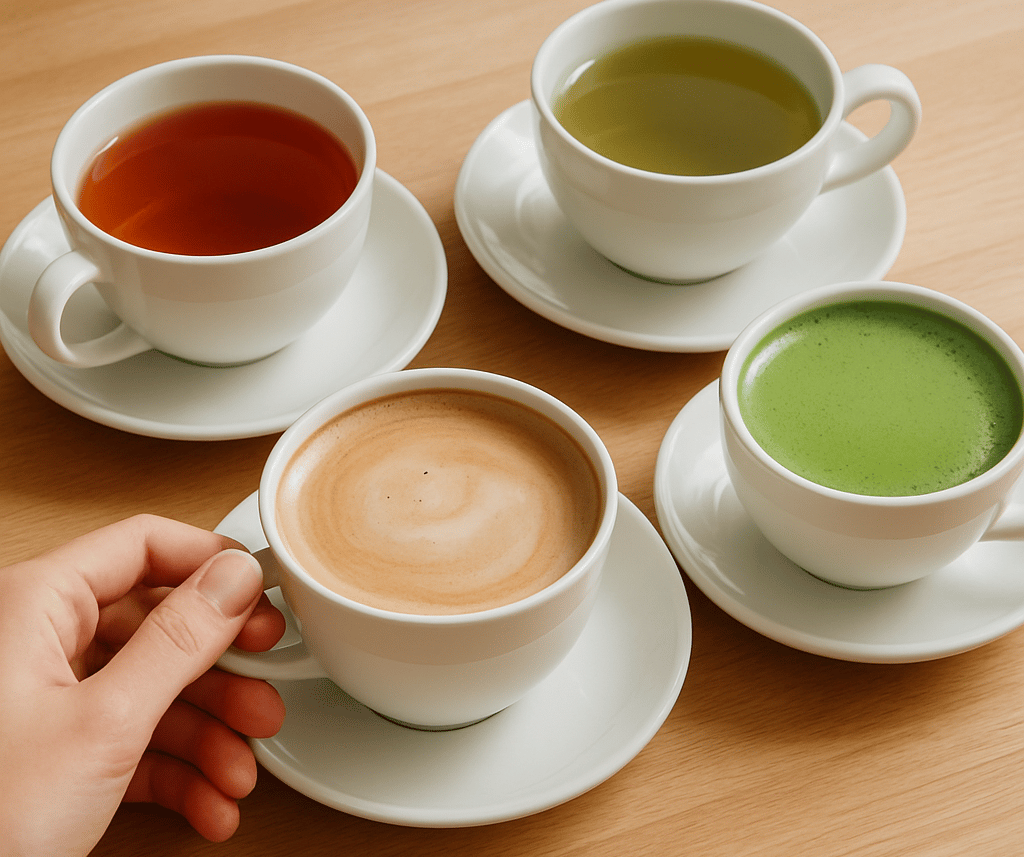Caffeine Under Control: Sleep Better, Stress Less, and Still Stay Energized
NUTRITIONCAFFEINECOFFEETEA
DR RITAKSHI, MD, CLINICAL NUTRITIONIST
8/7/20253 min read


Caffeine Control: Finding Balance
By Dr. Ritakshi – Medical Doctor & Clinical Nutritionist
Caffeine — the world’s most popular stimulant — fuels countless mornings, powers long workdays, and is often our go-to companion during deadlines. While coffee, tea, and even energy drinks can give us that much-needed mental alertness, too much caffeine can disrupt sleep, spike anxiety, and even impact hormonal balance.
The key is not to eliminate caffeine completely, but to strike a healthy balance that supports focus, mood, and long-term wellness.
Understanding Caffeine: How It Works
Caffeine works by blocking adenosine, a neurotransmitter that promotes sleepiness. This keeps us alert and awake. However, it also stimulates adrenaline release, which can make your heart race and raise stress hormones — great for a short burst of energy, but not ideal if overused.
Caffeine’s effects last 4–6 hours on average, but sensitivity varies. Some people metabolize it quickly and sleep fine after an evening cup; others find even a 2 PM coffee / tea affects their night’s rest.
Signs You May Be Overdoing Caffeine
Midday crashes despite morning coffee
Restlessness, jitters, or a racing heartbeat
Difficulty falling or staying asleep
Dependence — headaches or irritability without your usual dose
Digestive discomfort or acid reflux (very common in Indian diets rich in masalas)
Healthy Daily Limits
Health guidelines suggest up to 400 mg of caffeine per day for most healthy adults — roughly:
3–4 cups (150 ml) of brewed coffee
OR 5–6 cups (150 ml) of black tea/green tea
OR a mix of beverages that total under 400 mg
⚠️ Pregnant and breastfeeding women should aim for 200 mg or less daily.
Smart Strategies for Caffeine Balance
1. Delay Your First Cup
Instead of drinking coffee right after waking, wait 60–90 minutes.
Cortisol, your natural alertness hormone, peaks soon after waking. Adding caffeine immediately can blunt its effect and lead to dependence.
Try warm lemon water or herbal tea in the first hour, then have your coffee mid-morning.
2. Avoid Caffeine After 2–3 PM
Caffeine has a long half-life, so late consumption can interfere with deep sleep.
Switch to decaf coffee, herbal teas (chamomile, peppermint, tulsi), or golden milk in the afternoon.
3. Hydrate Between Cups
Caffeine is mildly diuretic. To avoid dehydration:
Follow the “coffee + water” rule: drink a glass of water for every cup of coffee or tea.
Keep an infused water bottle at your desk (mint + cucumber or lemon work well).
4. Choose Quality Over Quantity
Instead of multiple weak cups, enjoy 1–2 high-quality brews.
Opt for freshly ground coffee or good quality tea leaves.
Avoid pre-mixed 3-in-1 coffee sachets loaded with sugar and artificial creamers.
5. Pair Caffeine with Protein
Having coffee or tea on an empty stomach can spike stress hormones and irritate the gut.
Have it with protein-rich snacks: boiled eggs, cottage cheese, paneer cubes, or a handful of nuts and seeds.
In Indian households, replacing morning biscuits with moong dal cheela or oats upma is a healthier habit.
6. Manage Stress Without Over-Relying on Caffeine
Many people drink more coffee not because they’re sleepy, but because they’re stressed.
Use deep breathing, short walks, or quick desk stretches instead of reaching for another cup.
If you’re in the corporate setting, try a 2-minute mindfulness break to reset focus.
7. Consider Caffeine-Free Boosters
If you need energy without caffeine:
Morning: Sunlight exposure, cold water face splash, a short cardio burst
Afternoon slump: A protein smoothie, fresh coconut water, or a brisk walk
Brain fog days: Hydration + B-vitamin rich snacks (like roasted makhana with seeds)
When to Seek Professional Help
If caffeine use is affecting your sleep quality, digestion, anxiety levels, or menstrual cycle, it may be time for a tailored nutrition and lifestyle plan. As a clinical nutritionist, I often guide clients through gradual caffeine reduction and replacement strategies that fit their work-life routine.
Final Takeaway
Caffeine can be your ally for focus and energy, but only if used with awareness. By understanding your body’s tolerance, timing your intake wisely, and balancing it with hydration, nutrition, and rest, you can enjoy your chai or coffee without letting it control you.
💡 Tip from Dr. Ritakshi:
If you ever feel you "can’t function without coffee," it’s not a sign you need more caffeine — it’s a signal your body needs better sleep, balanced meals, and stress management.
Struggling to find your perfect caffeine balance? Let’s work together to create a personalized nutrition and energy plan that fits your lifestyle.
📩 Write to me at hello@drritakshi.com — I’d love to help!
